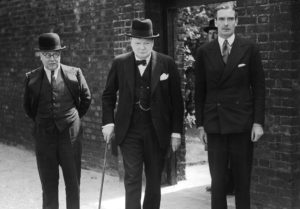
1910-1919
Summer 1910 (Age 35)

Winston Churchill, Parliament Square, London © Sue Lowry & Magellan PR
February 10, 2015
The Tonypandy Riots
In April, the Lords finally passed the “People’s Budget,” but the Liberals, determined to prevent the Lords from ever vetoing Commons legislation, introduced the Parliament Bill. Churchill assumed the responsibility for piloting it through the Commons.
The death of King Edward VII in May brought a brief respite from political strife. In June the new sovereign, King George V, called an All-Party Constitutional Conference, but it failed to produce an acceptable compromise. Although an initial proposal for a coalition Cabinet excluded Churchill, he was eventually considered for the War Office. In the end, the Tories would have no truck with either Churchill or Lloyd George.
In July, WSC introduced to the House major reforms in the prison system: time would be allowed to pay debts instead of debtors being sent to prison; suspended sentences were provided for trivial offenses; offenses punishable by prison sentences were reduced for drunkards and youthful offenders. “The first real principle which should guide anyone trying to establish a good system of prisons,” Churchill said, “should be to prevent as many people as possible getting there at all.”
Following a cruise in the eastern Mediterranean with Clementine, he returned to face a strike in the mines of South Wales which would eventually result in an incident in a town whose name would leave a perhaps undeserved blemish on the record of one of the greatest Home Secretaries. The town was Tonypandy.
Subscribe
WANT MORE?
Get the Churchill Bulletin delivered to your inbox once a month.



